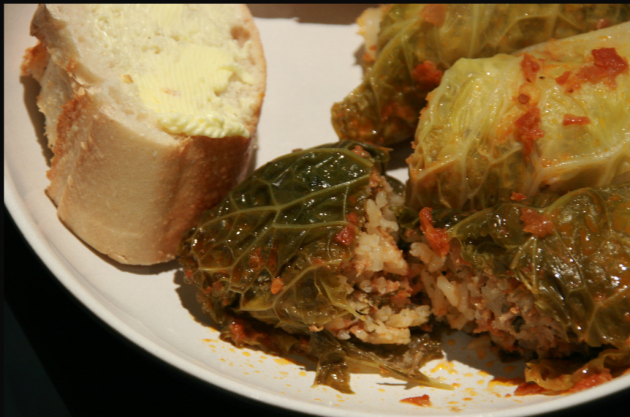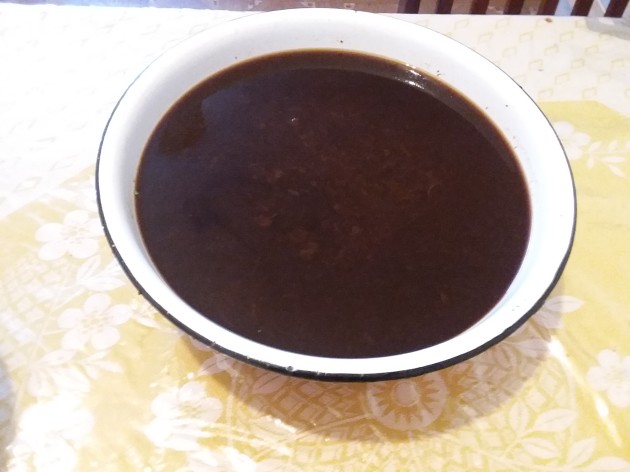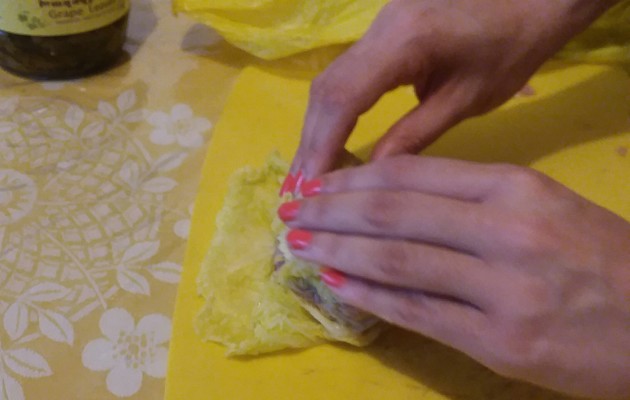The Lilith Blog 1 of 2
August 23, 2017 by Rebecca Mordechai
Subversion, Sex, and Savoy Cabbage: Reclaiming Azerbaijan’s Jewish Cooking

Photo credit: Lou Robinson
“Can I cook with you?”
“Repeat what you said.” Blatant surprise lingered in my mother’s voice.
That was to be expected. I can master only the contents of a kid’s menu: mac and cheese, home fries, perhaps, if I’m feeling fancy, breaded chicken cutlets. What my mother makes, however, is the Russian novel of cuisine—layered, complicated, and undeniably time-consuming.
But I was having guests over for Shabbat dinner and I wanted to be as Martha Stewart as possible. My guests were Ashkenazic millennials who, after decades of munching on potato kugel, craved to challenge their palates with Eastern saffron and sumac.
“Can you cook a dish with your mom?” Erica asked, as she was lounging on my couch one day.
“Yes. You’re from Azerbaijan. Cook lamb!” Josh piped in from the kitchen.
But my friends didn’t quite comprehend how Azeri Jewish cuisine signifies a weighty inner conflict, and why I often resist cooking it.
***
When my mother cooks, she stands over the sink for hours, shifting her weight from one tired knee to the other, wrapping savoy cabbage leaves around dollops of ground meat silently and firmly; it’s her private meditation. In fact, her cooking waxes spiritual in other ways, as she mutters prayers to God while stirring a broth composed of dried sour green plums. The quiet intimacy of her cooking is powerful, and despite our having a relationship that is tense with cultural misunderstandings, her yerpaghi (stuffed cabbage) and oshkena (meat soup) consistently taste like fierce maternal affection.

A pot of freshly boiled sour green plums that the yerephagi soaks in.
Although, when I was younger, there were moments when the quiet intimacy of her cooking transformed into an unnerving frenzy. My mother sweated from her forehead, distractedly turned the pages of her recipe book, and curtly said, “If you’re not cooking, step out of the kitchen.” This frenzy usually happened only when she had guests—namely, Azeri male guests: cousins and uncles, fellow synagogue-attendees and her children’s in-laws (I’m the youngest of six).
Was I over-thinking when I first drew a parallel between my mother’s frenzy and the fact that she was hosting men? Perhaps her anxiety is triggered simply by having company over in general. After all, who among us is completely Zen when having guests silently judge whether our napkins match our plates or whether our taste in wine is sufficiently cultivated?
Yet pronouncing that my mother suffered from just a universal case of people-pleasing did not seem to explain all of her behaviors. Why was she a shrill, brusque insomniac when the guests were predominantly male? Always aware of how Muslim-influenced Azeri culture bleeds through my family’s daily life, I suspected that good old fashioned misogyny was behind her freneticism.
“My father never wanted to see an empty spot on the table,” my mother once reminisced, while peeling onions for her kebabs. “Every inch on the table needed to be covered with meat, stews, and basmati rice. My mother would rise at dawn for days to make one holiday dinner.”
***
I romanticize the females in my family, and their semblance to a figure in a Dutch Golden Age portrait: feminine, soft skinned, feeding children bits of freshly made chicken with one flour-encrusted palm, while pummeling dough with the other. But while I aspire to embody the nurturing warmth of these women, I also know that much of their cooking is a performance for the patriarchy.
When I turned 21, a prime marriageable age in the Orthodox community, I was still religious. So I asked my mother whether she could call a matchmaker on my behalf, but she shook her head and said, “Do you know how to cook or know how to iron a man’s shirt? You’re not prepared for marriage yet, dear.” Although driven by love, her words belonged more on the script of a “Fiddler on the Roof” remake, and less in a dialogue with a daughter newly enamored by the works of Gloria Steinem.
While I was growing intellectually, I felt uncomfortable about how my budding feminist consciousness was pushing away the true hallmark of the Azeri Jewish woman: glorious domesticity. When my grandmother visited from Kuba, Azerbaijan and watched as I carried a glass (without any handles!) of steaming tea for my grandfather, she punished me with a frigid gaze. Apparently, I carried that scalding glass (without any handles!) like an awkward chimp trying to avoid burning her fingers, instead of like a perfectly postured duchter chuna (roughly translated as “daughter of the home” in Juhuri, the Azeri Jewish language of my ancestors).
I wasn’t the granddaughter she’d traveled 6,000 miles for. I was the spoiled American one: eager to eat, but not eager to cook. My identity as an Azeri Jewish woman was half-baked, and every female relative I came across giggled nervously at my domestic ineptitudes to mask their judgment. They were terrible at masking.
But in spite of the insecurity that clawed at me every time I fumbled with pots and pans, I was excited to cook the savory stews of the Caucasus Mountains for my otherwise cholent-chomping friends. My mother, still surprised that I chose to venture into the kitchen, agreed to guide me through the daunting steps of soaking, dicing, boiling, and delicately folding cabbage leaves around meat.
***
I walked into my parents’ house on a humid July afternoon, wearing a short sleeved button-down and shorts. The first things I encountered were my mother’s tight-pressed lips and disappointed dark eyes; it foreshadowed a maelstrom of cultural discord.
“Oy, Riiiivkaaa!” my mother cried. Each syllable in my Hebrew name was smothered in sadness. “How can you be wearing those shorts? Respect yourself. You have married brothers who are raising young children. You need to uphold the family name in our community.”
I knew that if I bit my tongue any further to avoid a retort, the metallicness of blood would settle on my tastebuds. What enraged me the most was how the institution of “married brothers” was stupidly dragged into a day that was supposed to be about connection—both to my mother and to my tradition’s cuisine.
“I’m going to be cooling down right now.” I could barely conceal my irritability. “I’m not in the mood to cook.” My mother wrung her hands at the daughter she produced; where had she gone wrong?
I tiredly walked up to my childhood bedroom, rested my head on the air conditioner, and thought of how unconscious misogyny was always in hot pursuit of my mother, from her days as a chaste teenager in the village square of Kuba to her days as a toiling grandmother on the hipster-laden streets of Brooklyn. And then, as I lifted my head from the air conditioner, I felt the familiar chill of delicious epiphany: The Azeri Jews’ ingrained-in-your-veins misogyny cannot be obliterated, it can only be transformed. I can take my innate sensuality (the same sensuality apparent in my exposed, oh-so-very-whorish thighs) and use it to connect to the culture’s food.
Subversion! Sex! Savoy cabbage! This mantra is now my meditative ritual as I cook.

Wrapping the cabbage around the ground meat in mom’s kitchen.
And so, with each directive that my mother gave after I had agreed to cook with her, I followed. But only under the conditions of this newfound ritual.
“First, rinse the dried sour plums,” she ordered. I rinsed them, and my fingers grew red. Red. That color of lustiness.
“Now while the plums boil, mix the ground meat.” I dug my fingers into the meat, and heard the raw squelch.
Squelch! That sound of sex.
“Stir the pot of boiling cabbage.” I stirred the pot, as my face grew flushed.
Flushed. That look of passion.
“Wrap the boiled cabbage tightly around the meat eight times.” I take the meat and wrap the freshly boiled cabbage around it eight times, feeling its warmth.
Warm. That feel of bodies.
***
My mother subverted her anti-religious communist youth by transforming her culture’s cooking into a private spiritual ritual.
I subverted my anti-feminist youth by turning my culture’s cooking into an indulgence of the sensuality that it hides in its cabbage folds.
We’re wildly different, but also somehow know that the kitchen is where the rebellion truly begins. Subversion. Sex. Savoy Cabbage.
The views and opinions expressed in this article are the author’s own and do not necessarily reflect those of Lilith Magazine.
 Please wait...
Please wait...